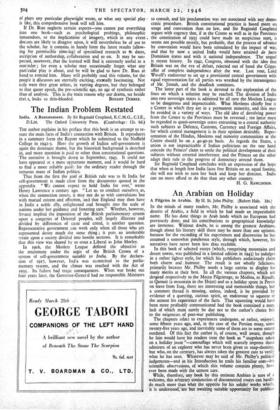The Indian Problem Restated
India. A Restatement. By Sir Reginald Coupland, K.C.M.G., C.I.E.,
D.Litt. The Oxford University Press.. (Cumberlege : 12s. 6d.) THE author explains in his preface that this book is an attempt to re- state the main facts of India's connection with Britain. It reproduces in a summary form the Report which he submitted to the Nuffield College in 1942-3. Here the growth of Indian self-government is again the dominant theme, but the historical background is sketched in, and more attention is paid to other than constitutional questions. The narrative is brought down to September, 1945. It could not have appeared at a more opportune moment, and it would be hard to find a more reliable guide for the ordinary reader through the tortuous maze of Indian politics.
That from the first the goal of British rule was to fit India for self-government is made clear from the documents quoted in the
appendix. " cannot expect to hold India for ever," wrote Henry Lawrence a century ago. " Let us so conduct ourselves...as, when the connection ceases, it may not do so with convulsions but with mutual esteem and affection, and that England may then have in India a noble ally, enlightened and brought into the scale of nations under her guidance and fostering care." Whether, however, Sy.,araj implied the imposition of the British parliamentary system upon a congeries of Oriental peoples, still largely illiterate and divided by differences of caste and creed, is another question. Representative government can work only when all those who are represented desire much the same thing ; it puts an intolerable F train upon a society divided into hostile sections. It is remarkable that this view was shared by so stout a Liberal as John Morley.
In 1916, the Moslem League defined the objective as the attainment under the aegis of the British Crown of a system of self-government suitable to India. By the declara- tion of 1917, however, India was ccasmitted to the parlia- mentary system, and the climax was reached with the Act of 1935. Its failure had tragic consequences. When war broke out four years later, the Governor-General had no responsible Ministers
to consult, and his proclamation was not associated with any demo- cratic procedure. British constitutional practice is based more on usage and convention than on law, and Sir Reginald Coupland argues with cogency that, if at the Centre as well as in the Provinces
, the constitution of 1935 could have made an auspicious start, it seems not possible merely, but probable, that the process of advance by convention would have been stimulated by the impact of war, and that by now a united India would have attained de facto Dominion status and with it national independence. The sequel is recent history. In 1942, Congress, obsessed with the idea that Britain was on the eve of defeat, rejected out of hand the Cripps offer of complete independence after the war. Last year, Lord Wavell's endeavour to set up a provisional central government with equal representation for all parties was wrecked by the intransigence of Mr. Jinnah, and the deadlock continues.
The latter part of the book is devoted to the exploration of the lines on which a solution may be reached. The division of India into two sovereign states is admitted by all save the Moslem League to be dangerous and impracticable. What Moslems chiefly fear is a Centre in which they are in a permanent minority, and this may be avoided in a variety of ways. The old idea of devolving power from the Centre to the Provinces must be reversed ; the latter must be regarded as quasi-sovereign states entrusting to a central authority such subjects as Defence, Customs, Currency and Foreign Affairs, for which central management is in their opinion desirable. Repre- sentation of the Hindus, Moslems and minority communities at the Centre should be on a 40-40-20 basis. As regards the States, a union is not impracticable if Indian politicians on the one hand concede the Princes' claim to settle the political development of their subjects without external interference and the Princes on the other adapt their rule to the progress of democracy around them.
Sir Reginald Coupland concludes with an expression of the hope that when at length free India faces free Britain on an equal footing, she will not wish to turn her back and keep her distance. India can no more afford to do that than any other country.
H. G. RAWLINSON.






























 Previous page
Previous page